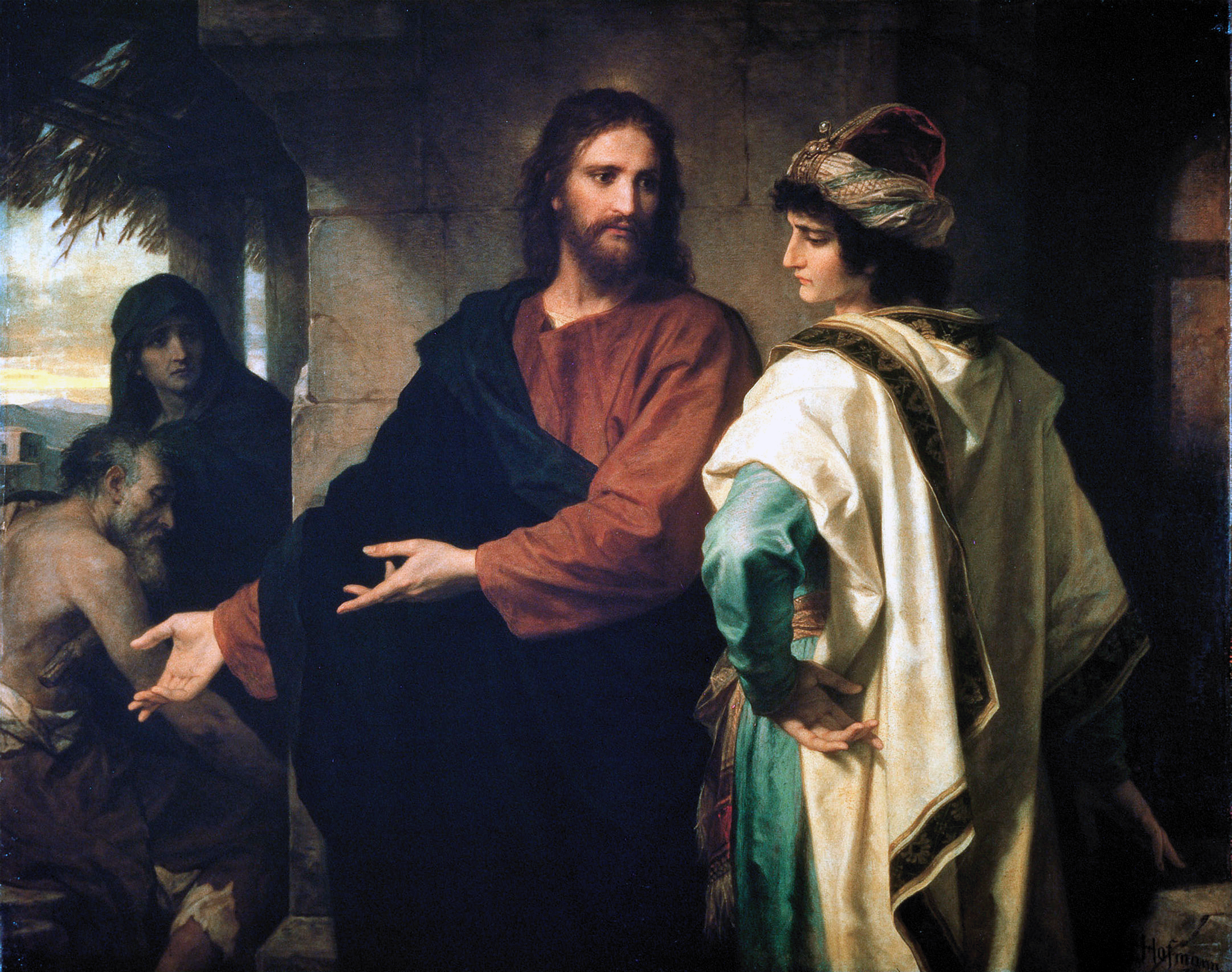
– 1889, by Heinrich Hoffman, oil on canvas, purchased by John D Rockefeller Jr, now residing at Riverside Church in New York.
-by Rev. Ronald Knox
“He went down the hillside with the slow, easy step of a man accustomed to deference from his fellows. A light breeze caressed him, like a ripple on the surface of the sunshine; he was well content. It was fitting that the contentment should mask itself in an outward fashion of melancholy; but the marriage of sunshine with a light breeze will whisper to a man’s heart even though he has buried his father only a few weeks back. The death had been long expected—you might almost say, unduly delayed; the Dark Angel had worn out, beforehand, his welcome of natural tears. And now that the debt of decent solemnity had been paid for four weeks—was it? or three weeks?—that other thought obtruded itself at times upon his consciousness, was obtruding itself even now, as he walked down the hillside. He was sole heir.
At first it had only lived on the faintest horizon of his attention. Naturally; did not his world know him as the most dutiful of sons? Had he not been everything to his father in those later years when strength was failing, the staff of his old age? Unthinkable that when death came, such a man should let down the flag of filial affection at a run. It was silenced, then, honorably and conscientiously, this unlovable distraction, banished to its corner like a child who will not behave himself in company.
Only, as the weeks passed, its “Mayn’t I come out now?” had been growing more insistent, and the inhibition that withstood it seemed daily less reasonable. Little details about the house and the estate, neglected by their late owner with an old man’s conservatism or parsimony, tugged at his attention like trailing branches in a forest path, “This and that must be put right now.”
Indeed, it had been partly to escape from this companionship of premature solicitudes that he had taken to the open country that afternoon. By the lakeside, where the rough fisher folk brought in the shining harvest of the unowned waters, he could shake off, perhaps, the thought of his inheritance.
And yet, there was no denying it, he was sole heir. Whatever expectations his younger brother might have had were forfeited long since, when he had realized the capital that was due to him and had set out to make his fortune—an unlucky business from the first! When he returned, bankrupt and discredited, he was received as a member of the family; there could be no question about that; but the annuity then settled on him was handsome and would be continued. True, the old man had spoken at times as if it was his intention to do more for the scapegrace in his will, but that was when his strength was failing, only when his strength was failing. Nothing could have been further from his wishes, in reality, than that there should be any division of the property. How tactless are the expectations of a younger son!
Besides, the property would not stand division. It brought in, even now, a comfortable income; but how generously its value might be increased if profits were husbanded and went back again into the improvement of the stock. As sole heir, he could see to that; already the prospect of increasing his inheritance began to present itself to him as a kind of filial duty, or perhaps a paternal duty, for he, too, one day, must resign to an heir his rich farms and his pleasant garden walks; the woods that had grown up with him would recognize a younger master, and only the faithful cypresses would bear him company to the grave.
Yes, for twenty years to come, the profits of every good season must go back into the land they sprang from; then, with the riper experience, and more educated palate of middle life, he would be able to enjoy the fruits of his own honest industry. Honest, thank God!—better anything than a prosperity secured by violation of the divine commands. These commands might almost have been themselves part of the property, so jealously had he kept them.
He had now well-nigh reached the sea’s level; and, as he rounded a scarp of the cliff, he saw a crowd gathered close to the water’s edge. A boat stood off a little way from the land, and toward it the faces of the crowd were turned in expectation. Could there have been some misadventure among the fishing people? Had the storm of last night, perhaps, claimed a toll of these humble lives? No, the boat was not putting in to shore; she was moored in a fathom or so of water.
In her stern a human form stood erect—the form (as it seemed from the gestures) of one making a public utterance. Of course, he might have known it earlier. He had heard, several months ago, rumors of the strange Preacher who somehow charmed an audience from that sluggish countryside—a fanatic, men said, and yet one who altered human lives by a word or a touch. There were stories, too, still harder to believe, that told of sick men suddenly healed, of devil-ridden folks set free.
A few hundred yards further along the shore, and he would be in full audience; the sloping beach made a natural amphitheater whose echoes carried far. Certainly he should be worth hearing, this much-praised, much-criticized Oracle of half a dozen fishing towns…”
Love,
Matthew

